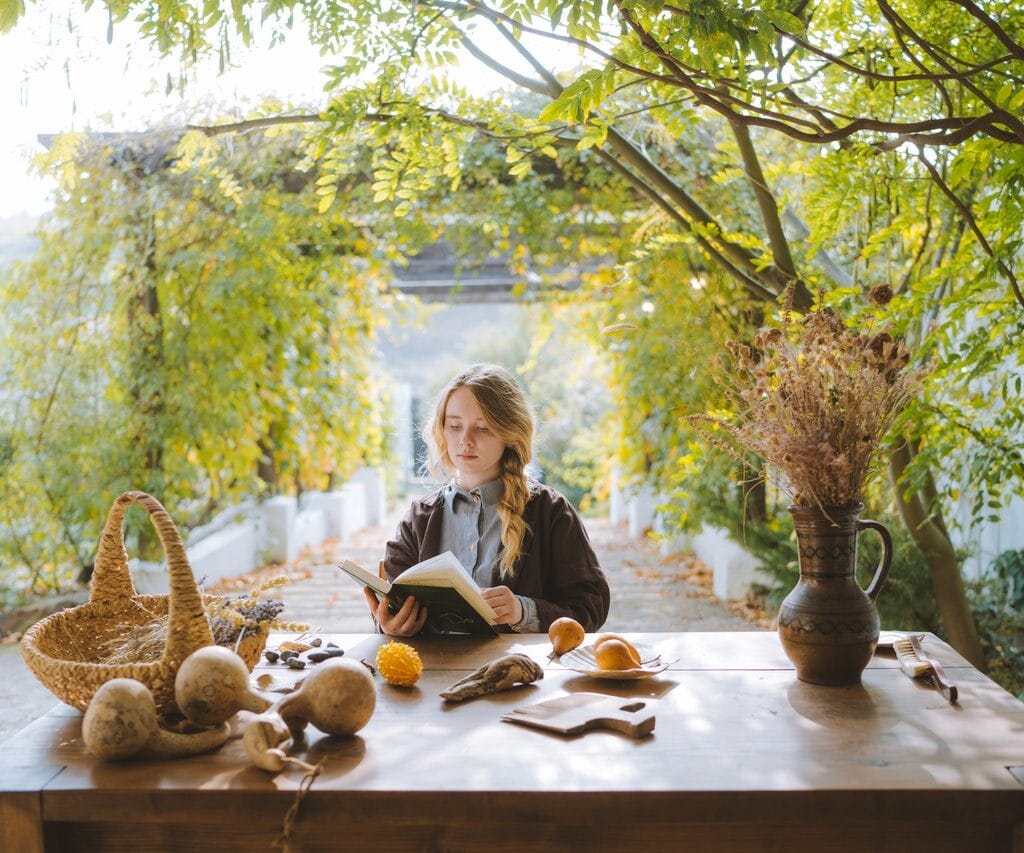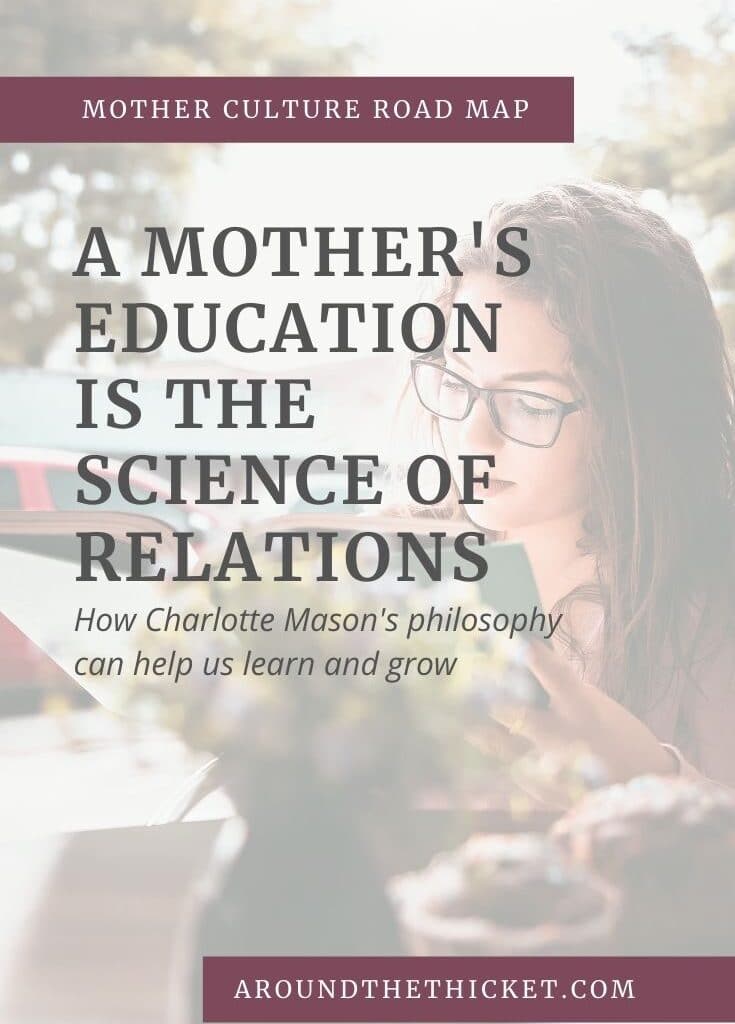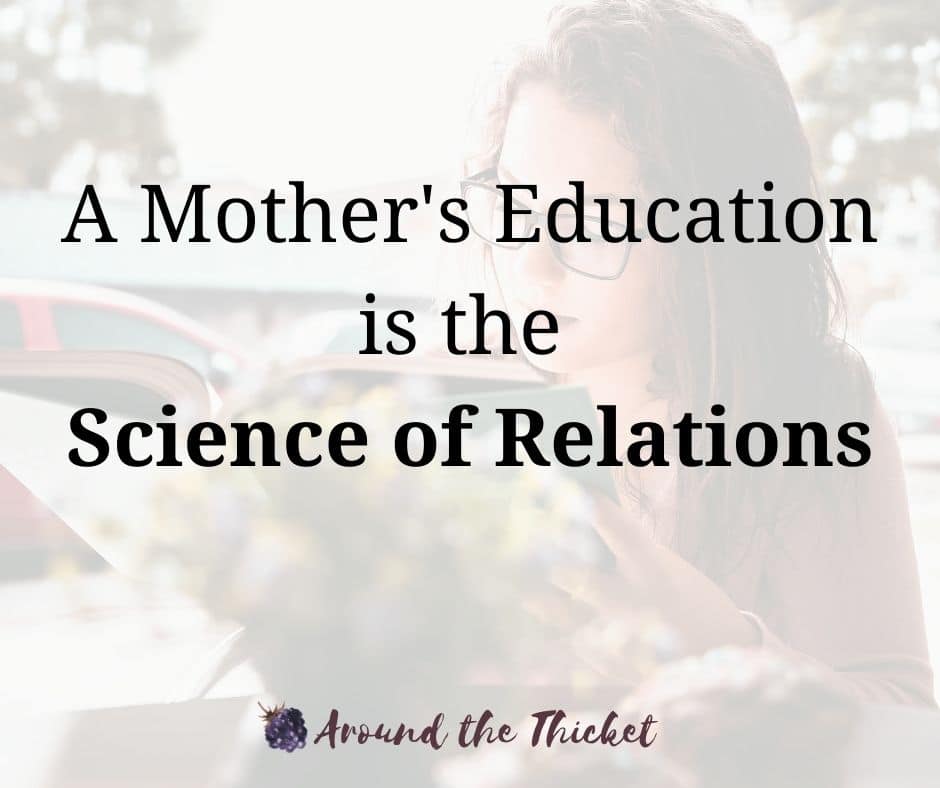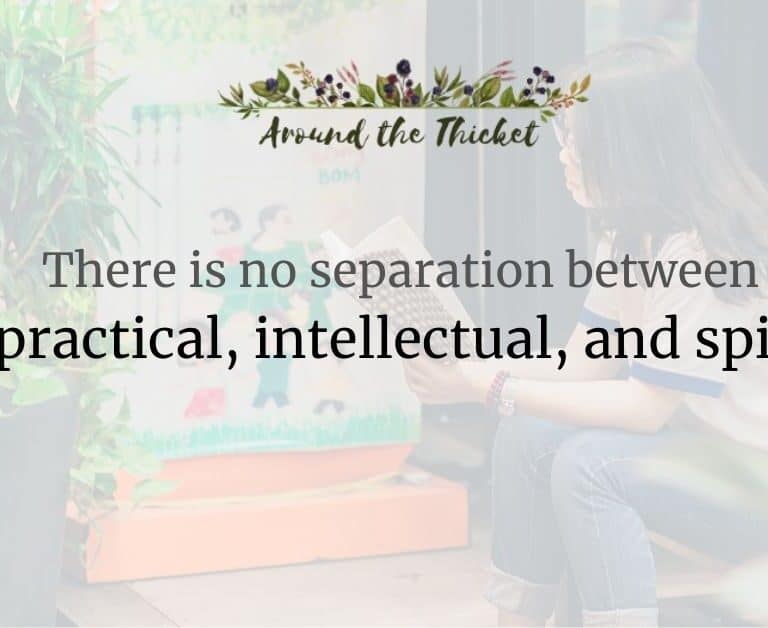A mother’s education is the science of relations.
I have been away from this series for a long time, so let’s review how we can apply Charlotte Mason’s principles of education to ourselves as mothers – or to any adult for that matter!
In the first few principles, we establish that we are born persons. We have an inborn desire to learn and an ability to take in knowledge. We recognize that our character has potential for good and for ill. Even as we are authorities in our home, we are still called to submit to authority ourselves, particularly the authority of God.
In Charlotte Mason’s philosophy, we also learn the means by which we can satisfy, and even revive, our desire for knowledge and to grow in character. We learn through the circumstances of life (atmosphere), we leverage habit to help us act rightly with less effort (habit), and we take in living ideas found in books (life). Education must be more than a utilitarian pursuit, and we are uniquely fitted to take in knowledge by reading widely. As adults, the responsibility for our education lies upon our own shoulders.
All of these ideas lead up to one of the most significant of Charlotte Mason’s principles. Until now we’ve been concerned with why and how we become educated. Finally, in her twelfth principle Charlotte Mason tells us what education is:
“Education is the Science of Relations”; that is, that a child has natural relations with a vast number of things and thoughts: so we train him upon physical exercises, nature lore, handicrafts, science and art, and upon many living books, for we know that our business is not to teach him all about anything, but to help him to make valid as many as may be of–
“Those first-born affinities
“That fit our new existence to existing things.”
Let’s look at what Charlotte Mason means by ‘the science of relations’, and what it means for our self-education as adults.

Education is the Science of Relations
When I hear the phrase ‘Education is the Science of Relations’, I think about making connections between two ideas. You might notice that a certain butterfly appears each spring when the apple tree comes into bloom. You might read a poem and realize you visited that place on holiday. There are countless relationships we can draw between two ideas, abstract or tangible. These connections are extremely important neurologically. The more connections we build between ideas, the more ‘hooks’ we have in that idea in order to remember it later. It is extremely difficult to retain new knowledge if we know nothing about it in the first place.
But the science of relations is not only about connecting ideas, but connecting one’s self to an idea. This is about building a relationship between us and an idea, a relationship where we know, take an interest, and care about the idea. You might have an interest in a historical figure or time period. This could be a familiarity with your garden birds and, out of an interest in their welfare, you choose to provide them with food and water. You might also put yourself into the shoes of a character in a book and live the story through his or her eyes. We don’t accumulate knowledge with our hearts untouched.
Our relationships should be broad
I began this series with my own experience of becoming a mother and how, in a moment, my world narrowed, filled almost completely with the immediate needs of my young children. While it is understandable, and right that we make our children’s needs a priority, we still need to take a wider view of knowledge and life than motherhood. We need more relationships than that between ourselves and our children and spouses. Charlotte Mason reminds us that education is about ‘how many orders of things we care about’. If all we know, all we care about, is our children, then we are not educated.
I recently read CS Lewis’ The Great Divorce with the Literary Life podcast. In a dream, the narrator travels through hell and arrives in heaven. He then observes many people as they consider whether to return to hell or go on to heaven. Lewis did non intend this to be an accurate representation of life after death, but a thought-provoking allegorical exercise. One tale particularly stood out to me: the story of one mother, who arrives in heaven demanding to see her son, who is there, but further in.
This mother had become so narrowly focused on her son, that in life, her world shrunk down so that he was the only thing that she cared about. In her grief at his death, she forgot to care about her husband and daughter. She spent the rest of her life in a shrunken universe. At the gates of heaven, she still could not lay aside her single-minded devotion to her son in order to turn her attention to God.
As Angelina, the host, says in that episode of the podcast, there is a love that makes you smaller. There is a love that constricts us, that limits us, that leads us more and more into ourselves. But there is also a love that expands our world and leads us Godward in all directions. As we grow in knowledge, in all directions, so our opportunities for knowing, loving, and serving God increase.

We should challenge ourselves to broaden our interests.
Charlotte Mason wrote that a child’s education should include ‘exercises, nature lore, handicrafts, science and art, and many living books’ because she believed that broad and diverse relationships are the essence of a good education. If we as adults want to further our education, it follows that we should broaden our own interests.
I don’t think this means that we need to have a thousand different hobbies or excel at all our pursuits. I also don’t think that this means we never specialize in a field, nor that we spend all of our time reading to the neglect of our families and other responsibilities. We should, however, challenge ourselves to expand our world beyond what is immediately in front of us.
Charlotte Mason wrote, ‘It is as true for children as for ourselves that, the wider the range of interests, the more intelligent is the apprehension of each.’ When we take the time we do have for reading, hobbies, and other leisure pursuits, and apportion some of it to what is novel, we are better placed to apprehend and to enjoy what we already know and love. I personally find that reading in groups where I don’t choose the books (like reading with a podcast or with a bookclub) gets me out of my comfort zone and introduces me to new ideas. I also include my child’s school books as part of my own feast of ideas. He is reading broadly, and so am I, learning along with him how to love history, geography, poetry, and more.
Wide relationships better fit us for our work and life
In The Great Divorce, CS Lewis describes hell is a place of increasing isolation. People move into the same street only to argue to the point that one party moves into the next street. There is no community, only increasing space between individuals. This stands in contrast to heaven, the place of ultimate community and unity. Relationships are perfected. Rather than moving ever outward, away from all others, the people in heaven move further and further in, closer to God.
As we read broadly, develop wide interests, and pursue a liberal education for ourselves, we little by little come closer to the community that God desires for us. As our interests widen, our capacity for loving and caring increases, and we are better fitted to live and work for God’s glory. Charlotte Mason writes in School Education,
“What is education after all? An answer lies in the phrase–Education is the Science of Relations. … What we are concerned with is the fact that we personally have relations with all that there is in the present, all that there has been in the past, and all that there will be in the future–with all above us and all about us–and that fulness of living, expansion, expression, and serviceableness, for each of us, depend upon how far we apprehend these relationships and how many of them we may lay hold of.”
Wide interests help us build the habit of forgetting ourselves. If we are in the habit of caring about many things, we naturally have less time for self-centeredness. If we increasingly build relationships between ourselves and many diverse ideas and disciplines, we are in a much better place to build relationships between ourselves and people who are different from us. Every new love expands our world, increases our ability for magnanimity, and brings us into unity with God’s world.
Yes, there is room for specialization in study, in calling, in career. But these special interests need the support and perspective that comes from maintaining a general attitude of interest and concern in the world.
Want to find your feet with the Charlotte Mason Way?

Grab my eight day mini course on the Charlotte Mason Essentials when you subscribe to my newsletter. You’ll get daily emails, a mini podcast series, and a printable workbook with reading assignments and action steps. You’ll be on your Charlotte Mason journey in no time!







